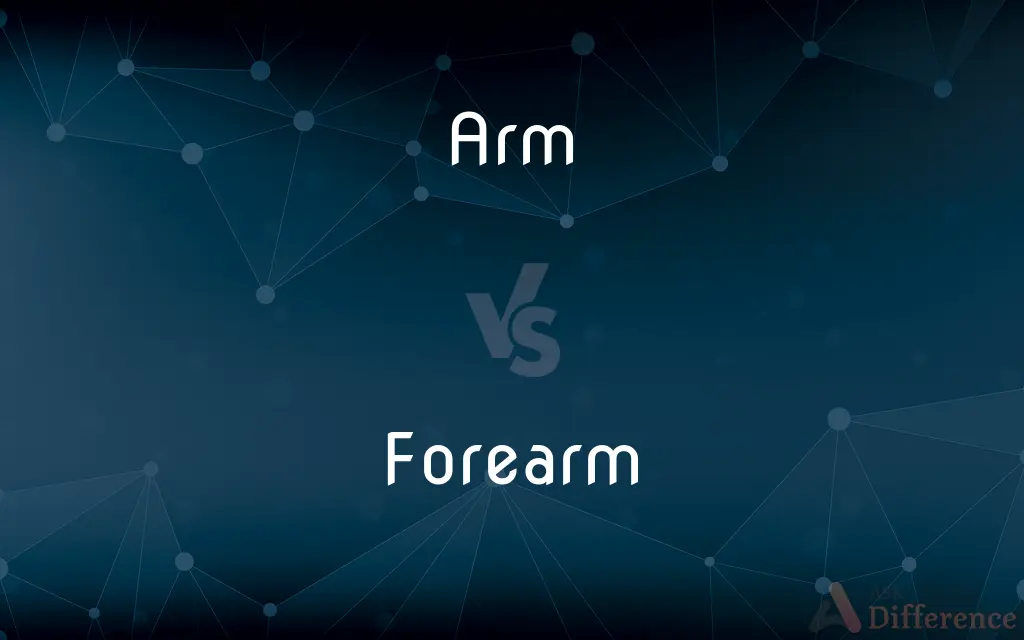Arm vs. Forearm — What's the Difference?
By Tayyaba Rehman — Updated on October 9, 2023
The arm is the entire upper limb from the shoulder to the wrist, while the forearm is the section between the elbow and wrist.

Difference Between Arm and Forearm
Table of Contents
ADVERTISEMENT
Key Differences
The arm and forearm are both essential parts of our upper body, enabling a range of motions and functionalities. The arm, in a broad sense, encompasses the entire upper limb starting from the shoulder and extending all the way to the wrist. On the contrary, the forearm narrows down this region, referring specifically to the segment between the elbow and the wrist.
Considering the anatomy of the human body, the arm plays a crucial role in lifting, reaching, and many more actions. It comprises the upper arm and the forearm. The forearm, in this context, is just a subset of the arm, consisting of two main bones: the radius and the ulna.
When people refer to their arm, they might be addressing the entirety of the limb, indicating everything from the top of the shoulder to the tips of the fingers. However, if they specify the forearm, they are distinctly pointing to the lower part of this limb, excluding the upper arm.
From a functional perspective, both the arm and forearm work in tandem to achieve intricate tasks like writing, lifting, or even simple gestures like waving. The muscles in the arm provide strength and broad movements, while those in the forearm allow for more precise actions, such as gripping.
In daily communication, it's not uncommon for people to use the term 'arm' generically. However, for clarity, especially in medical or anatomical contexts, distinguishing between the arm and forearm is vital. The arm is the overarching structure, and the forearm is a specific section of this larger component.
ADVERTISEMENT
Comparison Chart
Anatomical Location
From shoulder to wrist
Between elbow and wrist
Components
Includes upper arm and forearm
Comprises radius and ulna bones
Muscular Focus
Broad movements and lifting
Precision movements and gripping
Common Usage
Often refers to entire upper limb
Specifically refers to lower part of arm
Injuries
Can include shoulder or elbow injuries
Typically involve wrist or lower arm
Compare with Definitions
Arm
Arm refers to the entire upper limb.
She had a tattoo that spanned the length of her arm.
Forearm
Forearm muscles facilitate precise hand movements.
His forearm muscles flexed as he played the guitar.
Arm
Arm extends from the shoulder to the wrist.
He broke his arm during a basketball game.
Forearm
Forearm is the area between the elbow and wrist.
He has a watch on his forearm.
Arm
Arm contains both the upper arm and forearm.
He wore a sleeve to protect his arm from the sun.
Forearm
Forearm contains the radius and ulna bones.
The artist painted intricate designs on her forearm.
Arm
In human anatomy, the arm is the part of the upper limb between the glenohumeral joint (shoulder joint) and the elbow joint. In common usage, the arm extends through the hand.
Forearm
Forearm serves as a grip strength determiner.
He exercised regularly to strengthen his forearm.
Arm
An upper limb of the human body, connecting the hand and wrist to the shoulder.
Forearm
Forearm is a subset of the arm.
She had a scar on her forearm from a childhood accident.
Arm
A part similar to a human arm, such as the forelimb of an animal or a long part projecting from a central support in a machine.
Forearm
The forearm is the region of the upper limb between the elbow and the wrist. The term forearm is used in anatomy to distinguish it from the arm, a word which is most often used to describe the entire appendage of the upper limb, but which in anatomy, technically, means only the region of the upper arm, whereas the lower "arm" is called the forearm.
Arm
Something, such as a sleeve on a garment or a support on a chair, that is designed to cover or support the human arm.
Forearm
To arm or prepare in advance of a conflict.
Arm
A relatively narrow extension jutting out from a large mass:an arm of the sea.
Forearm
The part of the arm between the wrist and the elbow.
Arm
An administrative or functional branch, as of an organization.
Forearm
The corresponding part of the foreleg in certain quadrupeds, such as a horse.
Arm
Power or authority:the long arm of the law.
Forearm
The part of the arm between the wrist and the elbow.
Arm
(Sports)The skill of throwing or pitching a ball well.
Forearm
(firearms) A section of the weapon between the receiver and the muzzle, used to hold the firearm steady.
Arm
A weapon, especially a firearm
Troops bearing arms.
ICBMs, bombs, and other nuclear arms.
Forearm
To arm in preparation.
Arm
A branch of a military force
Infantry, armor, and other combat arms.
Forearm
To arm or prepare for attack or resistance before the time of need.
Arm
Warfare
A call to arms against the invaders.
Forearm
That part of the arm or fore limb between the elbow and wrist; the antibrachium.
Arm
Military service
Several million volunteers under arms.
The profession of arms.
Forearm
The part of the superior limb between the elbow and the wrist
Arm
(Heraldry) Bearings.
Forearm
Arm in advance of a confrontation
Arm
Insignia, as of a state, an official, a family, or an organization.
Arm
To supply or equip oneself with weaponry.
Arm
To prepare oneself for warfare or conflict.
Arm
To equip with weapons
Armed themselves with loaded pistols.
Arm a missile with a warhead.
Arm a nation for war.
Arm
To equip with what is needed for effective action
Tax advisers who were armed with the latest forms.
Arm
To provide with something that strengthens or protects
A space reentry vehicle that was armed with a ceramic shield.
Arm
To prepare (a weapon or electronic system, such as an alarm) for use or operation, as by releasing a safety device.
Arm
The portion of the upper human appendage, from the shoulder to the wrist and sometimes including the hand.
She stood with her right arm extended and her palm forward to indicate “Stop!”
Arm
(anatomy) The extended portion of the upper limb, from the shoulder to the elbow.
The arm and forearm are parts of the upper limb in the human body.
Arm
A limb, or locomotive or prehensile organ, of an invertebrate animal.
The arms of an octopus
Arm
The part of a piece of clothing that covers the arm.
Arm
A long, narrow, more or less rigid part of an object extending from the main part or centre of the object, such as the arm of an armchair, a crane, a pair of spectacles or a pair of compasses.
The robot arm reached out and placed the part on the assembly line.
Arm
(geography) A bay or inlet off a main body of water.
Shelburne Bay is an arm of Lake Champlain.
Arm
A branch of an organization.
The cavalry arm of the military service
Arm
(figurative) Power; might; strength; support.
The arm of the law
The secular arm
Arm
A pitcher
The team needs to sign another arm in the offseason.
Arm
(genetics) One of the two parts of a chromosome.
Arm
A group of patients in a medical trial.
Arm
(usually used in the plural) A weapon.
Arm
(in the plural) heraldic bearings or insignia.
The Duke's arms were a sable gryphon rampant on an argent field.
Arm
; hostilities; deeds or exploits of war.
Arm
To take by the arm; to take up in one's arms.
Arm
(transitive) To supply with armour or (later especially) weapons.
The king armed his knights with swords and shields.
Arm
To supply with the equipment, knowledge, authority, or other tools needed for a particular task; to furnish with capability; to equip.
Arm
(transitive) To prepare (a tool, weapon, or system) for action; to activate.
Remember to arm the alarm system before leaving for work.
Arm
To become prepared for action; to activate.
Arm
(transitive) To cover or furnish with a plate, or with whatever will add strength, force, security, or efficiency.
To arm the hit of a sword; to arm a hook in angling
Arm
(intransitive) To take up weapons; to arm oneself.
Arm
(transitive) To fit (a magnet) with an armature.
Arm
; lacking in riches or wealth.
Arm
To be pitied; pitiful; wretched.
Arm
The limb of the human body which extends from the shoulder to the hand; also, the corresponding limb of a monkey.
Arm
Anything resembling an arm
Arm
Fig.: Power; might; strength; support; as, the secular arm; the arm of the law.
To whom is the arm of the Lord revealed?
Arm
A branch of the military service; as, the cavalry arm was made efficient.
Arm
To take by the arm; to take up in one's arms.
And make him with our pikes and partisansA grave: come, arm him.
Arm your prize;I know you will not lose him.
Arm
To furnish with arms or limbs.
His shoulders broad and strong,Armed long and round.
Arm
To furnish or equip with weapons of offense or defense; as, to arm soldiers; to arm the country.
Abram . . . armed his trained servants.
Arm
To cover or furnish with a plate, or with whatever will add strength, force, security, or efficiency; as, to arm the hit of a sword; to arm a hook in angling.
Arm
Fig.: To furnish with means of defense; to prepare for resistance; to fortify, in a moral sense.
Arm yourselves . . . with the same mind.
Arm
To provide one's self with arms, weapons, or means of attack or resistance; to take arms.
Arm
A human limb; technically the part of the superior limb between the shoulder and the elbow but commonly used to refer to the whole superior limb
Arm
Any instrument or instrumentality used in fighting or hunting;
He was licensed to carry a weapon
Arm
An administrative division of some larger or more complex organization;
A branch of Congress
Arm
Any projection that is thought to resemble an arm;
The arm of the record player
An arm of the sea
A branch of the sewer
Arm
The part of an armchair or sofa that supports the elbow and forearm of a seated person
Arm
The part of a garment that is attached at armhole and provides a cloth covering for the arm
Arm
Prepare oneself for a military confrontation;
The U.S. is girding for a conflict in the Middle East
Troops are building up on the Iraqui border
Arm
Supply with arms;
The U.S. armed the freedom fighters in Afghanistan
Arm
Arm is responsible for broad upper body movements.
She stretched her arm to reach the top shelf.
Arm
Arm serves as a general term for the upper extremity.
She had a birthmark on her left arm.
Common Curiosities
Can 'arm' and 'forearm' be used interchangeably?
No, while 'arm' can generically refer to the whole upper limb, 'forearm' is specific to the lower part between elbow and wrist.
Which part of the body does the term 'arm' refer to?
The arm refers to the entire upper limb, from the shoulder to the wrist.
Is the elbow part of the arm or the forearm?
The elbow is the joint that connects the upper arm and the forearm.
How many bones make up the arm?
The arm has three main bones: the humerus in the upper arm and the radius and ulna in the forearm.
Why is forearm strength important?
Forearm strength aids in gripping and precise hand movements.
Is the wrist part of the forearm?
The wrist is the joint at the end of the forearm connecting it to the hand.
How is the forearm different from the arm?
The forearm is the section of the arm between the elbow and the wrist.
Which part of the arm is more prone to fractures?
Both parts can be vulnerable, but the forearm, especially near the wrist, is commonly fractured in falls.
Do the muscles of the arm and forearm work independently?
While they have specific functions, they often work in tandem for coordinated movements.
What bones are in the forearm?
The forearm contains two main bones: the radius and the ulna.
What is the main function of the arm?
The arm facilitates a range of motions like lifting, reaching, and interacting with the environment.
Which muscles are found in the forearm?
The forearm has various muscles that control hand and finger movements, like the flexors and extensors.
Can injuries in the arm affect the forearm?
Yes, injuries to the arm, especially near the elbow, can impact the functionality of the forearm.
In which scenarios is it crucial to differentiate between the arm and forearm?
In medical, anatomical, and athletic contexts, it's essential to distinguish between the arm and forearm.
How can one distinguish between the upper arm and forearm?
The upper arm extends from the shoulder to the elbow, while the forearm goes from the elbow to the wrist.
Share Your Discovery

Previous Comparison
Civil vs. Civilian
Next Comparison
Gangling vs. GanglyAuthor Spotlight
Written by
Tayyaba RehmanTayyaba Rehman is a distinguished writer, currently serving as a primary contributor to askdifference.com. As a researcher in semantics and etymology, Tayyaba's passion for the complexity of languages and their distinctions has found a perfect home on the platform. Tayyaba delves into the intricacies of language, distinguishing between commonly confused words and phrases, thereby providing clarity for readers worldwide.
















































